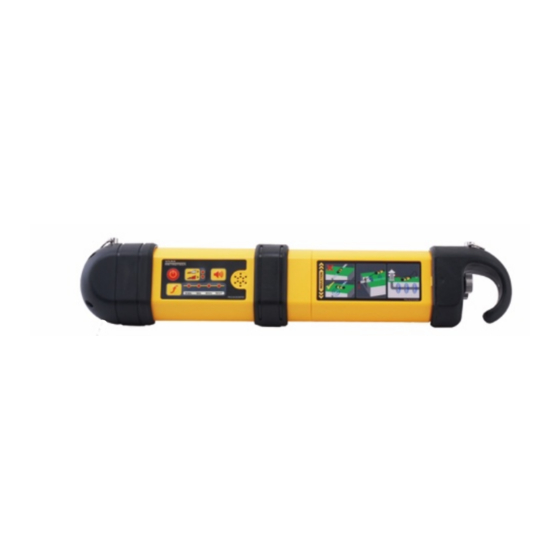
Advertisement
Quick Links
Introduction
This guide describes using the VM-550FF 1-watt, and the Loc3-5Tx 5-watt transmitters to locate the pushrod cable on the Type-MX and
Type-CP cable reels. The locator being used is the vLoc3-Cam receiver, but users of the full range of Vivax-Metrotech locators will also
find it useful.
Transmitter Operational Controls
The VM-550FF Transmitter is a multi-frequency 1-watt transmitter. The FF and two low frequencies are not relevant for this application;
only the high frequency of 83kHz should be used. The locate frequency is applied by direct connection or induction. For this application,
the direct connection method must be used.
VM-550FF What's in the box
VM-550FF Connection Block
VM-550FF Overview
VM-550FF Keypad
For the purpose of locating the pushrod cable deployed in a pipe or locating a utility, only the 83kHz frequency and hi/low power options
need be used.
Locating Push Camera Cable Quick Guide
1.
2.
3.
4.
5.
1.
2.
1.
2.
3.
4.
5.
6.
7.
8.
9.
VM-550FF Transmitter
Ground stake
Direct connection lead
Transmitter carry strap
4 x D Cell alkaline batteries
Direct connection socket
Socket cover
On/Off button
Output power select and indicator
Speaker volume select
Speaker
Battery housing cover
Connection lead socket
Frequency select
Frequency selected indicators
Battery cover retaining screws
Page 1 of 7
Advertisement

Summary of Contents for Vivax Metrotech VM-550FF
- Page 1 Introduction This guide describes using the VM-550FF 1-watt, and the Loc3-5Tx 5-watt transmitters to locate the pushrod cable on the Type-MX and Type-CP cable reels. The locator being used is the vLoc3-Cam receiver, but users of the full range of Vivax-Metrotech locators will also find it useful.
- Page 2 Locating Push Camera Cable Quick Guide The Loc3-5Tx Transmitter is a multi-frequency 5-watt transmitter. When using this model transmitter, only frequencies above 65kHz should be used. The locate frequency can be applied by direct connection or induction. For this application, the direct connection method must be used.
- Page 3 Locating Push Camera Cable Quick Guide vLoc3-Cam Receiver On/Off Increase sensitivity Reduce sensitivity Mode select Select frequency Depth readings Active Location of the Camera Pushrod Cable Locating the route of the deployed pushrod cable is possible with the use of a transmitter, which will apply a precise locate signal to one of the pushrod cables conductors.
- Page 4 Locating Push Camera Cable Quick Guide Method: • Applying a signal 1. Connect the red lead to the reels connection post. 2. Connect the black lead to a suitable ground such as a ground stake inserted in the soil. If possible, place the ground stake at right angles to the suspected pipe direction as the earth lead may interfere with signals coming from the Pushrod cable.
- Page 5 Locating Push Camera Cable Quick Guide 8. Hold the locator vertically and rotate it on its axis until the compass indicates Forward/Back and is filled in blue color, as in the above illustration. 9. Adjust the sensitivity control, using the "+" and "-" keys, so that the bar graph is at approximately 50%. 10.
- Page 6 Locating Push Camera Cable Quick Guide 15. Continue to trace the pushrod cable along the route. As the end of the pushrod cable is reached, the signal will rapidly reduce. This is to be expected and typically will happen a meter or two (3-6 feet) from the camera head. At this point, the signal will start to be distorted, and the depth measurement will be affected.
- Page 7 Locating Push Camera Cable Quick Guide 10. Keeping the null indicator on the vertical line, walk toward the arrow. 11. A Sonde icon will soon appear (Note that the arrow is not shown when the sonde icon appears). Keeping the locator vertical, carry on walking toward the Sonde until it is positioned on the crosshairs.

Need help?
Do you have a question about the VM-550FF and is the answer not in the manual?
Questions and answers